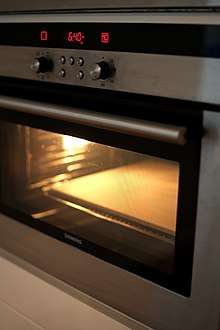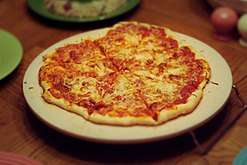Baking stone
A baking stone is a portable cooking surface used in baking. It may be made of ceramic, stone or, more recently, salt.[1][2] Food is put on the stone, which is then placed in an oven, though sometimes the stone is heated first.[3] Baking stones are used much like cookie sheets, but may absorb additional moisture for crispier food.[4][5] A pizza stone is a baking stone designed for cooking pizza.

Overview
Due to the thermal mass of baking stones and the material's property as a poor heat conductor, food is less likely to burn when one uses a baking stone instead of metal or glass bakeware. Baking stones are a variation on hot stone cooking, which is one of the oldest cooking techniques known. Some cooks recommend sprinkling corn meal or flour on the baking stone to prevent the crust from sticking or using parchment paper atop the stone.[6][7][8][9] Baking "stones" may be purchased as unglazed ceramic tiles, unglazed fired clay tiles and quarried tiles, from tile shops and hardware stores.[2][10][11]
To prevent fracturing of the stone by thermal shock, some bakers place the baking stone in a cold oven and heat it over at least 45 minutes,[2] then allow it to cool slowly inside the oven after switching it off. Because of the possibility of rapid temperature change[12], baking stones should not be left in an oven while it is in self cleaning mode.[13]
Baking stones can be cleaned with a dry brush or scouring pad followed by plain hot water.[13] Because it is porous, a baking stone will absorb any fluid it contacts,[5] including detergent. Use of any detergents may taint the stone, imparting the flavor of detergent to foods later cooked on the stone.[14]
Pizza stone
When designed for cooking pizzas, a baking stone is often referred to as a pizza stone. Using a pizza stone more or less mimics the effects of cooking a pizza in a masonry oven. The porous nature of the stone is commonly believed to absorb moisture; resulting in a crispier crust. Small pizza stones can be purchased to fit any conventional cooking oven or an enclosed barbecue-style grill. High-end ovens sometimes offer optional pizza stones that are specifically designed for each oven model and may include a specialized heating element. In addition to traditional methods, a pizza stone can also be made out of metal.[15][16]
Types of Pizza Stone
- Stone
- Ceramic
- Cast Iron
- Cordierite[17]
- Clay[18]

A pizza atop a pizza stone
See also
- Earth oven – underground ovens
- Masonry oven – colloquially known as a brick oven or stone oven
References
- Bitterman, Mark (2010). Salted: A Manifesto on the World's Most Essential Mineral, with Recipes. Ten Speed Press. p. 271. ISBN 9781580082624.
- Fowler, D.L.; Stratton, A. (2005). Damon Lee Fowler's New Southern Baking: Classic Flavors for Today's Cook. Simon & Schuster. p. 27. ISBN 978-0-7432-5058-0. Retrieved October 11, 2017.
- Hitz, C. (2008). Baking Artisan Bread: 10 Expert Formulas for Baking Better Bread at Home. Quarry Books. p. 36. ISBN 978-1-61673-526-5. Retrieved October 11, 2017.
- Orsini, G.; Orsini, J.E. (2007). Italian Baking Secrets. St. Martin's Press. p. 53. ISBN 978-0-312-35820-4. Retrieved October 12, 2017.
- Bridge, F.; Tibbetts, J.F. (1991). The well-tooled kitchen. Morrow. p. 136. Retrieved October 12, 2017.
- Jordan, M. (2011). California Home Cooking: 400 Recipes that Celebrate the Abundance of Farm and Garden, Orchard and Vineyard, Land and Sea. America cooks. Harvard Common Press. p. 263. ISBN 978-1-55832-119-9. Retrieved October 12, 2017.
- Brooks, M. (2006). The Guaranteed No Burnt Bottoms Cookies Cookbook. Monica's Best Bakes. p. 13. ISBN 978-0-615-13418-5. Retrieved October 12, 2017.
- Reinhart, P.; Manville, R. (2011). The Bread Baker's Apprentice: Mastering the Art of Extraordinary Bread. The Bread Baker's Apprentice: Mastering the Art of Extraordinary Bread. Potter/TenSpeed/Harmony. p. 260. ISBN 978-1-60774-129-9. Retrieved October 12, 2017.
- Black, S. (2016). One Dough, Ten Breads: Making Great Bread by Hand. Houghton Mifflin Harcourt. p. 158. ISBN 978-0-544-57933-0. Retrieved October 12, 2017.
- Reinhart, P.; Manville, R. (2007). Peter Reinhart's Whole Grain Breads: New Techniques, Extraordinary Flavor. Cookery, Food and Drink Series. Ten Speed Press. p. 85. ISBN 978-1-58008-759-9. Retrieved October 12, 2017.
- Alterman, T.; Nauman, T. (2015). Whole Grain Baking Made Easy: Craft Delicious, Healthful Breads, Pastries, Desserts, and More - Including a Comprehensive Guide to Grinding Grains. Voyageur Press. p. 90. ISBN 978-0-7603-4598-6. Retrieved October 12, 2017.
- "Understanding the Best Oven Temperature for Making Pizza Using Different Oven Types".
- Cook's Illustrated Cookbook: 2,000 Recipes from 20 Years of America's Most Trusted Food Magazine. America's Test Kitchen. 2011. p. 3463. ISBN 978-1-936493-13-5. Retrieved October 11, 2017.
- Gemignani, T.; Morgan, D.; Peterson, S. (2012). Pizza: More than 60 Recipes for Delicious Homemade Pizza. Chronicle Books LLC. p. 18. ISBN 978-1-4521-1276-3. Retrieved October 12, 2017.
- Parsons, Russ (February 1, 2013). "A pizza stone of steel". Los Angeles Times. Retrieved October 14, 2017.
- Perry, Charles (February 22, 2006). "Soapstone: cookware that rocks". Los Angeles Times. Retrieved 2017-10-11.
- "10 Best Pizza Stone Reviews For Oven & Grill 2018 - Foodies Wiki". Foodies Wiki. 2018-10-10. Retrieved 2018-11-01.
- "Top 10 Best Pizza Stone 2020 – Reviews & Buying Guide". 2019-12-17. Retrieved 2020-04-17.